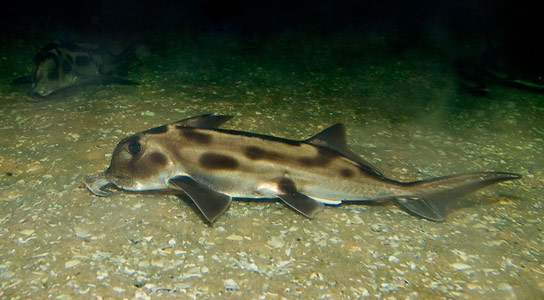
The immune system of the elephant shark is simpler than many other vertebrates studied so far. The present studies also explain, why cartilaginous fishes do not generate human-like bones. Credit: Fir0002/Flagstaffotos
Researchers have decoded the genome of the elephant shark, providing new insights into immunity and bone formation.
An international team of researchers, including scientists of the Max Planck Institute of Immunobiology and Epigenetics, has sequenced and analyzed the genome of the elephant shark. Comparison of the elephant shark genome with human and other vertebrate genomes has revealed why the skeleton of sharks is made up largely of cartilage and not bone like the human skeleton and that the immune system of the shark is much simpler than that of humans. The findings of Byrappa Venkatesh and his coworkers are published in the latest issue of the scientific journal, Nature.
An unexpected finding of the immune system analysis was that sharks appear to lack special types of so-called T-helper lymphocytes, that – until now – were considered to be essential for defense against viral/bacterial infections and preventing autoimmune reactions such as diabetes and rheumatoid arthritis in vertebrates.
Despite this seemingly primitive organization of the immune system, sharks exhibit robust immune defenses and are long-lived. “The structure of the immune system of the elephant shark is very different from mammals,” said Thomas Boehm, co-author and director at the Max Planck Institute of Immunobiology and Epigenetics in Freiburg, Germany. “It is obvious that sharks can efficiently deal with all kinds of infections without this particular cell type. This indicates that nature can come up with different solutions to the same problem,” stated Boehm.
What happens when T-helper cells are being destroyed can be observed in AIDS patients, who succumb to viral and bacterial infections. Up to now, it was assumed that cells are essential for an immune system. The new results are challenging this long-held notion and open up an unprecedented avenue towards the development of non-intuitive strategies to modulate the immune functions of humans.
The researchers also investigated why cartilaginous fishes, including the elephant shark, are unable to replace cartilage with bone like humans and other bony vertebrates. Genome analysis was able to highlight a family of genes that are absent in sharks but present in all bony vertebrates and are critical for bone formation. When the researchers inactivated these genes in bony fishes such as the zebrafish, calcification did not occur. This finding is a strong indication that the investigated gene family could be a starting point for a better understanding of bone diseases such as osteoporosis.
In addition, the study revealed that the elephant shark genome is the slowest evolving among all vertebrates. The elephant shark even beats the coelacanth, also called “the living fossil”, that has recently been shown to evolve extremely slowly. Therefore, the elephant shark is probably the best proxy for the ancestor of all jawed-vertebrates that became extinct a long time ago.
Cartilaginous fishes (comprising sharks, rays, skates, and chimaeras) are the oldest living group of jawed-vertebrates that diverged from bony vertebrates about 450 million years ago. The elephant shark (Callorhinchus milii) is a chimaera that inhabits temperate waters of the continental shelves off southern Australia and New Zealand, at depths of 200 to 500 meters (660 to 1600 feet). From approximately 1,000 species of cartilaginous fishes, elephant shark was chosen as a model because of its relatively compact genome which is one-third the size of the human genome.
The elephant shark genome project was funded mainly by the National Institutes of Health (NIH), USA. It is a collaborative effort of scientists from 12 international institutions, including the Max Planck Institute of Immunobiology and Epigenetics (MPI-IE) in Freiburg, Germany. Viruses, bacteria, and other parasites are a continuous threat to all living beings. Therefore, most of them possess elaborate defense strategies to combat these unwanted intruders. At the Max Planck Institute of Immunobiology and Epigenetics, Thomas Boehm studies the evolution of the immune system and its development and function during lifetime of animals. For his fundamental work on development, differentiation, and evolution of immune systems, Thomas Boehm was awarded the prestigious Ernst Jung Award for Medicine 2014.
Reference: “Elephant shark genome provides unique insights into gnathostome evolution” by Byrappa Venkatesh, Alison P. Lee, Vydianathan Ravi, Ashish K. Maurya, Michelle M. Lian, Jeremy B. Swann, Yuko Ohta, Martin F. Flajnik, Yoichi Sutoh, Masanori Kasahara, Shawn Hoon, Vamshidhar Gangu, Scott W. Roy, Manuel Irimia, Vladimir Korzh, Igor Kondrychyn, Zhi Wei Lim, Boon-Hui Tay, Sumanty Tohari, Kiat Whye Kong, Shufen Ho, Belen Lorente-Galdos, Javier Quilez, Tomas Marques-Bonet, Brian J. Raney, Philip W. Ingham, Alice Tay, LaDeana W. Hillier, Patrick Minx, Thomas Boehm, Richard K. Wilson, Sydney Brenner and Wesley C. Warren, 8 January 2014, Nature.
DOI: 10.1038/nature12826









It is interesting to note that elephant shark which is highly cartilaginous and which is also a living fossil gets its immunity not through the conventional T-cells like that of humans. Its genetic make-up takes a different route to provide immunity to them which is very essential for survival against virus and bacteria, and this had got to be studied, to help us to overcome AIDS like diseases which are purely due to disappearance of T-cells. In this context, I would like to quote one more thing. Have we not come across aquatic birds which are immune to H1N5 like viruses and it should be noted that these birds are also more cartilaginous when compared to mammals. Probably, calcification and strong bone formation calls for T-Cells for providing immunity. Thank You.